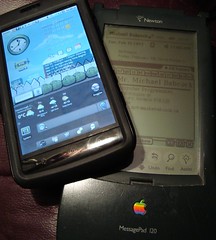People who've known me a while usually know me as a computer guy. Back in the mid to late nineties, this was especially apparent because I carried this odd looking hand-held computer around with me -- the Apple Newton MessagePad.
This is long before Apple started work on the iPhone or even iTunes, and most certainly before the iPad, but the functionality was incredible for the time and when I pull it out and play with it from time to time I'm reminded there are features still not well replicated on modern devices.

Sure, my new Dell Streak (shown overlapping my MessagePad 120 here) is in full colour, has Wifi, 3G and Bluetooth, but neither Android nor iOS replicate some of the core functionality found on a Newton.
I could pull up the notepad screen for instance and write out (in longhand) "Remember Cindy's birthday next Wednesday" and then click the 'Assist' button on the screen to have the Newton open the calendar, scroll to next Wednesday, and create a day-long reminder named "Cindy's Birthday". Other functionality such as customized business card styles on a per-contact basis were very nice for personalizing individual contacts. It understood the difference between business entries ("Microsoft Support") and people ("Bill Gates").
I could start drawing free-hand on the notepad screen and it would interpret the shapes I was drawing -- freehand circles became perfectly round (and had editable edges that could be dragged to accurately fix sizing), lines and other shapes properly aligned and closed, etc.
Do I want to go back to using it for my day to day routine? Of course not, its slow and bulky compared to modern devices. But do I wonder why after fifteen years I don't have functional handwriting recognition and basic AI on my new tablet phone? I sure do.



